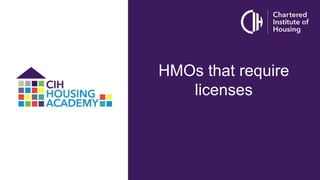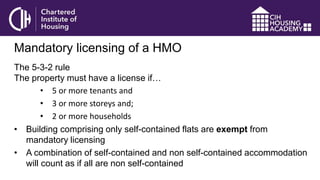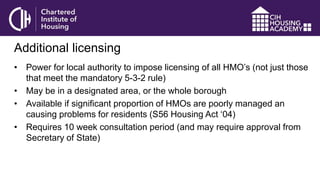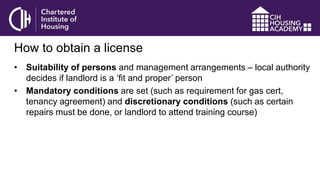HMOs that require licences
- 2. Mandatory licensing of a HMO The 5-3-2 rule The property must have a license if… • 5 or more tenants and • 3 or more storeys and; • 2 or more households • Building comprising only self-contained flats are exempt from mandatory licensing • A combination of self-contained and non self-contained accommodation will count as if all are non self-contained
- 3. Additional licensing • Power for local authority to impose licensing of all HMO’s (not just those that meet the mandatory 5-3-2 rule) • May be in a designated area, or the whole borough • Available if significant proportion of HMOs are poorly managed an causing problems for residents (S56 Housing Act ‘04) • Requires 10 week consultation period (and may require approval from Secretary of State)
- 4. How to obtain a license • Submit application • Pay a fee – this will vary for each local authority • 5 years – maximum amount of time that a license will last for • License applies to the specified property in the application – it is not transferable • Suitability of property – the local authority may stipulate what amenities such as bathroom/kitchens need to be provided
- 5. How to obtain a license • Suitability of persons and management arrangements – local authority decides if landlord is a ‘fit and proper’ person • Mandatory conditions are set (such as requirement for gas cert, tenancy agreement) and discretionary conditions (such as certain repairs must be done, or landlord to attend training course)
- 6. Offences and enforcement Criminal offence to be a person having control of or managing a licensable HMO without a license. Local authority may prosecute or choose to apply civil penalty of up to £30,000’ Unable to use S21 Local authority or occupier can apply for a rent Repayment Order (up to 12 months rent repaid)






